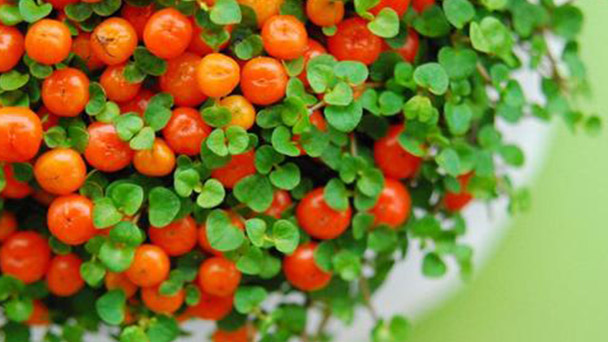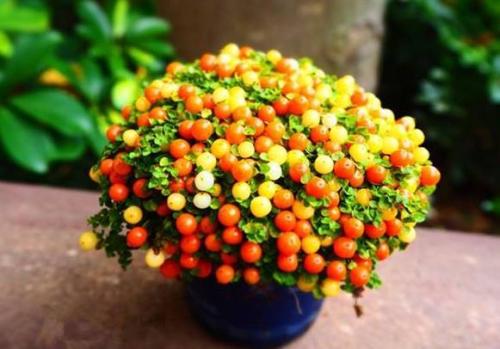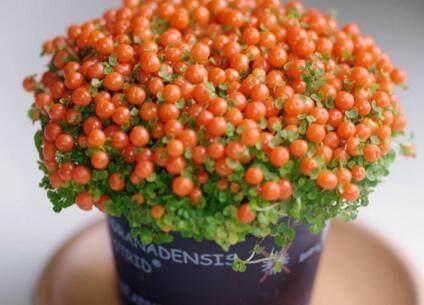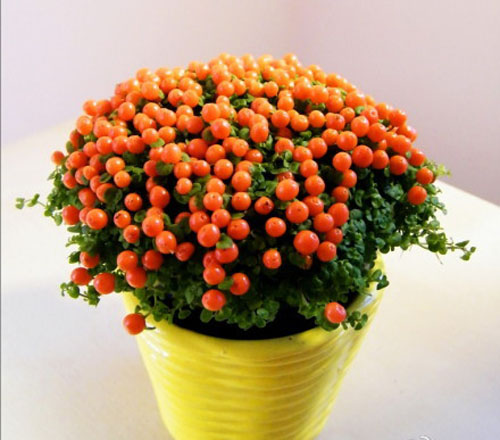Coral bead plant profile
Written by Maggie
Mar 15 2021

Coral bead plant, scientific name Nertera granadensis, is a small evergreen herb of the Rubiaceae genus. Coral bead plant is a creeping evergreen perennial herb with creeping stems, densely opposite leaves and often rooting at nodes. Leaves are broadly ovate, 4 -- 8 mm long, pale green, slightly fleshy.
Coral bead plant is a small and delicate plant with bright and lovely orange beaded berries, hence the nicknames coral bead plant and Coral moss. The plant can be kept on the desk for several months and is regarded as the treasure of indoor ornamental plants.
Coral bead plant picture

Morphological characteristics of coral bead plant
Coral bead plant is a creeping evergreen perennial herb with creeping stems, densely opposite leaves and often rooting at nodes. Leaves are broadly ovate, 4 -- 8 mm long, pale green, slightly fleshy.
Coral bead plant is a small and delicate plant with bright and lovely orange beaded berries, hence the nicknames Coral bead plant and Coral moss. The plant can be kept on the desk for several months and is regarded as the treasure of indoor ornamental plants.
Coral bead plant bell-shaped flowers small, ca. 3 mm in diam., pedicellate; Small dense, bright orange-red berries, 8 mm in diameter. The flower is very small, green, after flowering knot orange-red small berry, diameter 0.5~0.6 cm.
The coral bead plant is a miniature potted fruit-watching plant with fruit covered on the surface of the plant.
Ecological habits of coral bead plant
Coral bead plants are native to many mountainous areas in the southern hemisphere. Coral bead plant likes a cold, damp environment, avoid strong direct sunlight, summer needs ventilation and cool.
Coral bead plants grow in sandy soil with good permeability and high humus content at temperatures between 10 and 20℃.
How to grow and care coral bead plant
Light
The light requirement slightly shades tolerance (half shade). Coral bead plants want a little stronger light, summer shading 40%~50%.
Moisture
Coral bead plant grows in moist soil.
The temperature
Strong cold resistance, ability to -10℃ below the low temperature. The suitable temperature for growth is 10~20℃, and the overwintering temperature is above 5℃.
Watering
With the dip basin method, lest waterfalls on the leaf, cause plant rot, summer basin soil is moist, winter is slightly dry. After the fruit has formed, you must make sure there is no water on the Coral bead plant or the fruit will rot. The temperature in winter is about 5℃.
Potted
The basin soil is peat soil mixed with decomposed horse manure. All four seasons to maintain the environment shade, not strong light irradiation.Peat soil small pot, 6~8 cm in diameter. Fertilizing every 1 to 2 weeks during the growing period; Keep the soil in the basin constantly moist and with high air humidity, and water by soaking or spraying at the bottom of the basin.
Flowering
Artificial pollination is necessary when flowering to ensure more fruit.
Repotting
When needed, the coral bead plant should be re-potted in the spring season only. It will remain confined within its available space happily for its entire life, so re-potting is only needed if you desire a larger plant.

Propagation of coral bead plant
Coral bead plants are usually propagated by sowing and dividing, seeded or by stem segments.
In cultivation, direct sunlight should be avoided, but not overshade, otherwise flowering and bearing bad fruit should be placed under bright scattered light conditions. Greenhouse cultivation is susceptible to grey mold, so humidity should be controlled.
Coral bead plant area of distribution
Coral bead plant is native to New Zealand, Chile and Peru. Its origin is distributed in Mexico and Central America. It has been introduced to China for a short time.
Coral bead plant distribution is extremely wide, in the south of Chile (Chile), Argentina (Argentina), Guatemala (Guatemala), west of New Zealand (New Zealand), Australia (Australia), Indonesia, Malaysia, Indonesia or) (Malaysia), Papua New Guinea (Papua New Guinea), the Philippines (Philippines) and Taiwan (Taiwan), and other places have their shadow.
Function and use of coral bead plant
Potted role
The coral bead plant, which can last for months on your desk, is considered a valuable indoor ornamental plant and is suitable for potting or ground cover.
Coral bead plant landscaping purposes
The coral bead plant is a valuable low-rise potted fruit-watching plant. Some areas can be used as fruit cover plants.

Latest Updated
- Benefits of Bugleweed - 7 Science-backed Health Benefits
- Bugleweed Dangers & Side Effects - Is It Poisonous?
- How to Plant Evergreen Trees - What You Should Know
- When to Plant Evergreens - Grow Guide for Evergreen Trees
- 12 Wonderful Evergreen Shrubs for Your Garden
- 12 Popular Evergreen Plants with Pictures for Beginners
- When And How To Prune A Lilac Bush Like a Pro
- How to Grow & Care for Lilac Vine (Hardenbergia Violacea)
- Japanese Lilac Tree (Syringa Reticulata) Care & Propagation Guide
- Shumard Oak Pros and Cons - What to Know
Popular Articles
- Winter maintenance of Antirrhinum Majus
- How to Grow Terminalia Mantaly Tree
- How to Grow and Care for Crossostephium Chinense
- How to grow Antirrhinum Majus in spring
- Peristeria Elata (Dove Orchid) Profile: Info & Care Guide
- Underwatered Snake Plant (Sansevieria Trifasciata) - Signs And How To Fix
- How to Care for Brazilian Jasmine Plant (Mandevilla Sanderi)
- How to Grow & Care for Graptopetalum Purple Delight in Summer
- Rosa Chinensis (China Rose): Plant Growing & Care Tips
- How to Care for Baby Sun Rose (Aptenia Cordifolia)